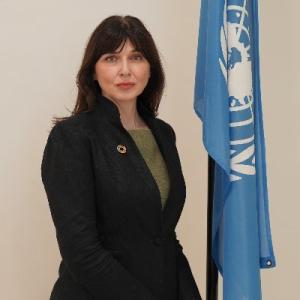Distinguished Guests, Esteemed Colleagues, Ladies and Gentlemen,
It is my great pleasure to welcome you all to the 10th conversation of our "29 Climate Conversations: The road to COP29" series.
Today, we gather to discuss a critical and timely topic: "Climate change and its impact on population dynamics."
I am delighted that we have partnered with the Ministry of Labor and Social Protection of Population and the UN Population Fund (UNFPA) for this important event.
Since Azerbaijan was selected to host COP29, we have witnessed a remarkable mobilization across different sectors of society, all gearing up for the UN Climate Change Conference in November.
As the United Nations in Azerbaijan, we remain committed to supporting the COP29 Presidency and engaging with all stakeholders to drive climate action across the nation.
The "29 Climate Conversations" initiative is an integral part of our engagement strategy, aimed at sparking nationwide dialogue and action on climate change and just transition. Each conversation in this series is a step towards fostering a deeper understanding and a more robust response to the climate challenges we face.
Today’s focus on the intersection of climate change and population dynamics is particularly significant. The impacts of climate change are far-reaching, affecting migration patterns, urbanization trends, and the overall demographic landscape. Understanding these links is crucial for developing policies that are both adaptive and inclusive.
Distinguished participants
If there is one key message I wish to convey today, it is the urgency of action. The next few years will largely determine whether we can limit global temperature rise to 1.5 degrees Celsius. To achieve this, we must cut emissions by 43 percent by 2030, compared with 2019 levels, and ensure that emissions peak by 2025.
The UAE Consensus, which was adopted at COP28 in Dubai, sets out an ambitious climate agenda to keep 1.5°C within reach. The UAE Consensus calls on countries to transition away from fossil fuels to reach net zero, encourages them to submit economy wide Nationally Determined Contributions (NDCs 3.0), and includes a new specific target for countries to triple renewables and double energy efficiency by 2030.
Moreover, addressing the demographic impacts of climate change requires innovative solutions and a collaborative approach.
Climate-induced migration, changes in population distribution, and the pressure on urban infrastructures are challenges that demand our immediate and sustained attention.
As highlighted in previous dialogues, innovation is not a choice but an obligation. We must leverage technology and innovative practices to reduce greenhouse gas emissions and help vulnerable communities adapt to the changing climate.
This innovation should also extend to how we plan for and manage population dynamics in the face of climate change.
When we talk about COP29, it is essential to remember that each Conference of the Parties is not just an event but part of a continuous process. Each COP builds on the outcomes of the previous ones, aiming to limit global temperature rise, help vulnerable communities adapt, and achieve net-zero emissions by 2050.
The vision for COP29, as articulated by the COP29 Presidency, is to enhance ambition and enable action. Indeed, both ambition and action need to go hand-in-hand in taking forward the UAE Consensus and the outcomes of COP28 and paving the way for COP30 in Brazil.
And it is with this spirit – of ambition and of action - that we would like to approach today’s conversation. By examining the links between population dynamics and both the causes and consequences of climate change, we pave the way for comprehensive, inclusive policies that will drive sustainable development and resilience.
As the UN system, we are fully committed to providing system-wide support to the COP29 Presidency to ensure its success.
Together, we can make a significant impact on the road to COP29 and beyond. Let us engage in a productive dialogue today and continue to work towards a sustainable and resilient future for all.
Thank you!




